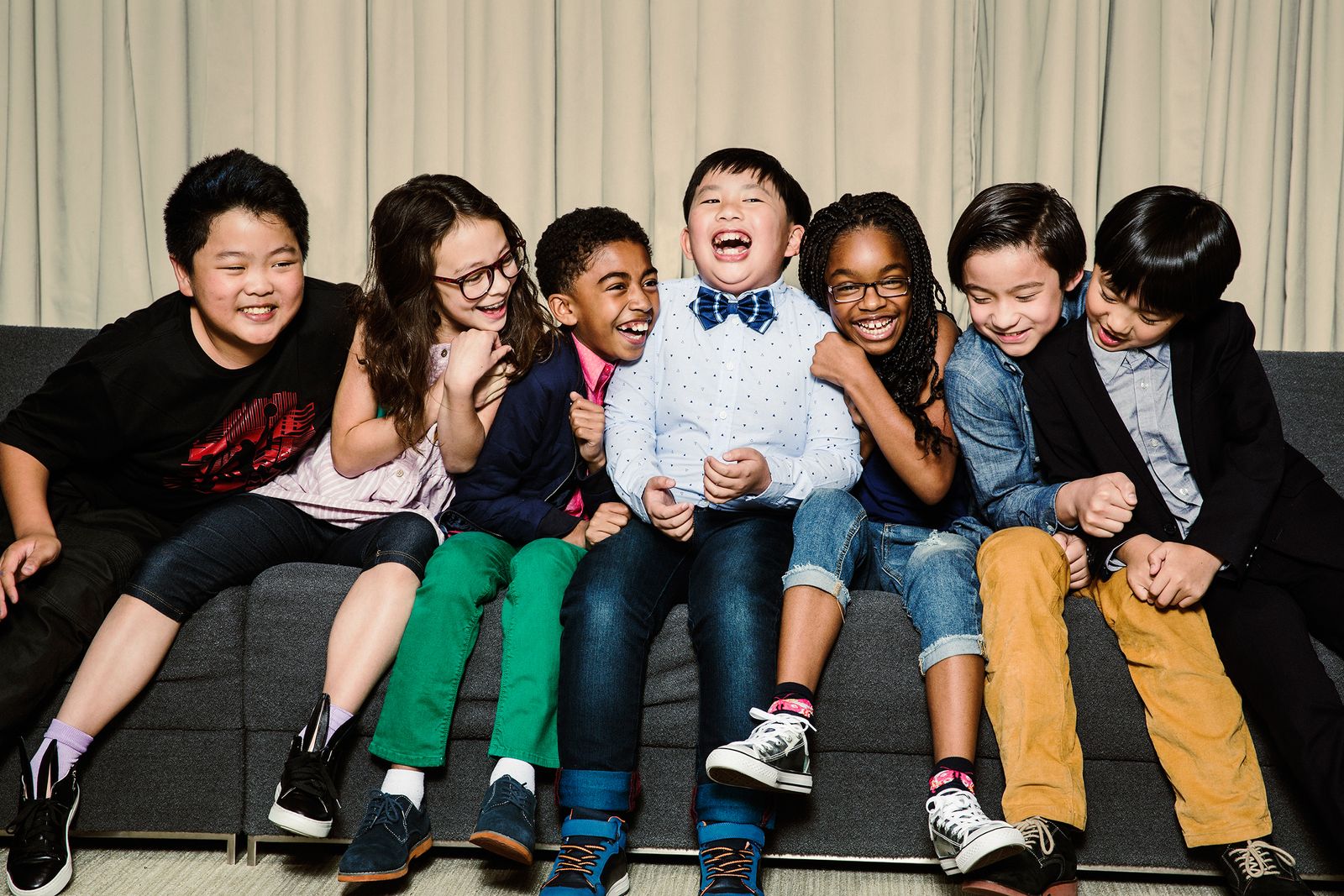Remember the days when child actors on TV entered a scene to deliver cute, whiny one-liners before they were sent to their rooms? In recent years, the shift toward single-camera comedies (the ones filmed like dramas, without an audience) on television has helped elevate underage actors from adorable fixtures to burgeoning performers, and nowhere is this more visible than on ABC’s diverse slate of family comedies: Fresh Off the Boat, Black-ish, Modern Family, Dr. Ken, The Goldbergs, and The Real O’Neals.
To find out more about what it’s like to be a child actor on television today, Vulture gathered seven stars from ABC’s comedy lineup — all aged 12 and under — for an hourlong conversation at the network’s headquarters in Burbank. Hudson Yang, Forrest Wheeler, and Ian Chen (Fresh Off the Boat); Miles Brown and Marsai Martin (Black-ish); Aubrey Anderson-Emmons (Modern Family); and Albert Tsai (Dr. Ken) talked about their experiences in front of the camera, and out in the world, as a result of their newfound fame.
Let’s talk about your first acting jobs. What was the part? How old were you?
Hudson Yang: Why is everyone looking at me? Okay! I’ll start off. My first acting job [was] Sisterhood of Night, a small independent film I got after auditioning. I didn’t have to do much. I was the younger brother of the daughter who was in this cult. So basically I had three lines, said those three lines, got out, never seen ‘em again. I was about 9.
Albert Tsai: My first acting job was the pilot in my first TV show, Trophy Wife. That was cool, since everything was new. It was awesome how they all made the TV show happen.
Aubrey Anderson-Emmons: My first job was Modern Family, actually.
Hudson: What? Really?
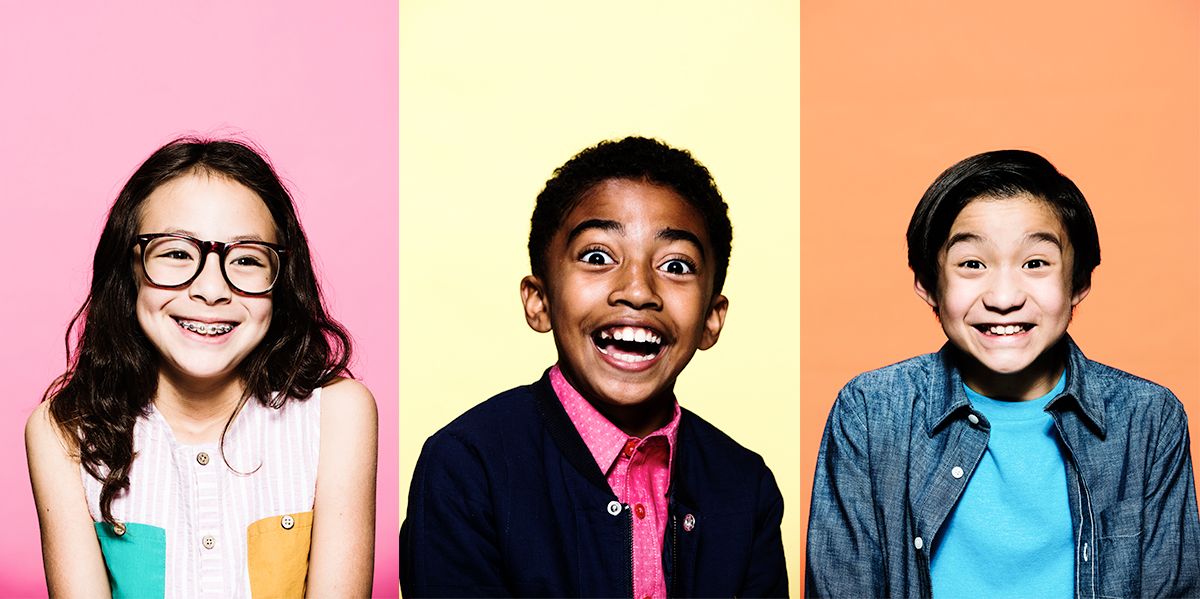
How old were you?
Aubrey: I was 4.
Ian Chen: Oh, wow!
What do you remember?
Aubrey: I really don’t remember anything. I had five lines, maybe, and I got to work with [Eric Stonestreet] and [Jesse Tyler Ferguson] that first day I went into the audition.
How did you learn your lines?
Aubrey: My mom just told me the lines, because I didn’t know how to read yet. I copied them and that’s what I did.
Miles Brown: That’s cool.
Forrest Wheeler: My first acting job was when I was 7. It was The Incredible Burt Wonderstone.
Miles: I love that movie! Oh my God!
Forrest: You do? Oh, cool! It was with Jim Carrey, Steve Buscemi, Steve Carell — lots of Steves — and also Olivia Wilde.
Wow! Quite the first job.
Forrest: I was in a scene with Steve Buscemi. He was a magician, and I played a Cambodian boy. He gave me a rabbit and thought I’d keep it as a pet. But he didn’t realize that our tribe was hungry so then I ended up trying to kill the rabbit.
Ian: Oh my God!
Forrest: I was 7. It was really, really fun.
Miles: My first acting job was for a Disney commercial. I was about 5 years old, and it was really cool. They did a bunch of animation with it [and] made it look like I was running in this really big yard and I had a carpet behind me. It looked like Mickey Mouse was flying over me.
What was the hardest part of that for you?
Miles: It wasn’t memorizing lines or anything. It was that the camera was on a golf cart right behind us. I had to run, and we were on grass, so the whole time grass is flying in my eyes.
Ian: What?
Miles: Because they’re going so fast. The grass is just falling in my eyes.
Forrest: Was that the time you had your big afro?
Miles: Yeah, I had my big afro.
Ian: My first job was for an electronics consumer company. I’m not allowed to tell any details so I’ll just go on to my next commercial. All I know is I missed my kindergarten graduation for it. The second commercial was for a tissue-paper company called Virjoy. I was supposed to be like — “There are more rolls in Virjoy than the other rolls.”
(Everyone laughs.)
Marsai Martin: My first acting job was a public service announcement about being a little lady. You know, like bullying and being strong and powerful. I had just turned 5.
What do you love most about acting?
Marsai: You get to work with such awesome people. When I worked on Black-ish, I was like, Am I working with Tracee Ellis Ross from Girlfriends? Wow! I’m working with Anthony Anderson from Kangaroo Jack? Whaaat? And some people I just love so much that I can’t even take it. (Looks at Miles) I love you!
Albert: I love playing different characters. It’s experiencing other people’s lives, almost.
Hudson: The people you meet, the things you do, the people you play. When you act, it allows you to try new things and play with who you are.
Ian: I 100-percent agree with Hudson. Another thing I love about acting is you get to meet new people and learn from them and how they act so you can become a better actor.
Miles: It’s also really cool to be part of a show that lasts forever, basically. Not a lot of shows can last as long as all of these shows.
Hudson: Even three seasons is amazing! And the next season after that you have syndication rolling. You can look back at the past and be like, Look how small I was! I’ve actually done that. I see myself and I’m like, What happened to my hair? What happened to my body? Why am I so short?
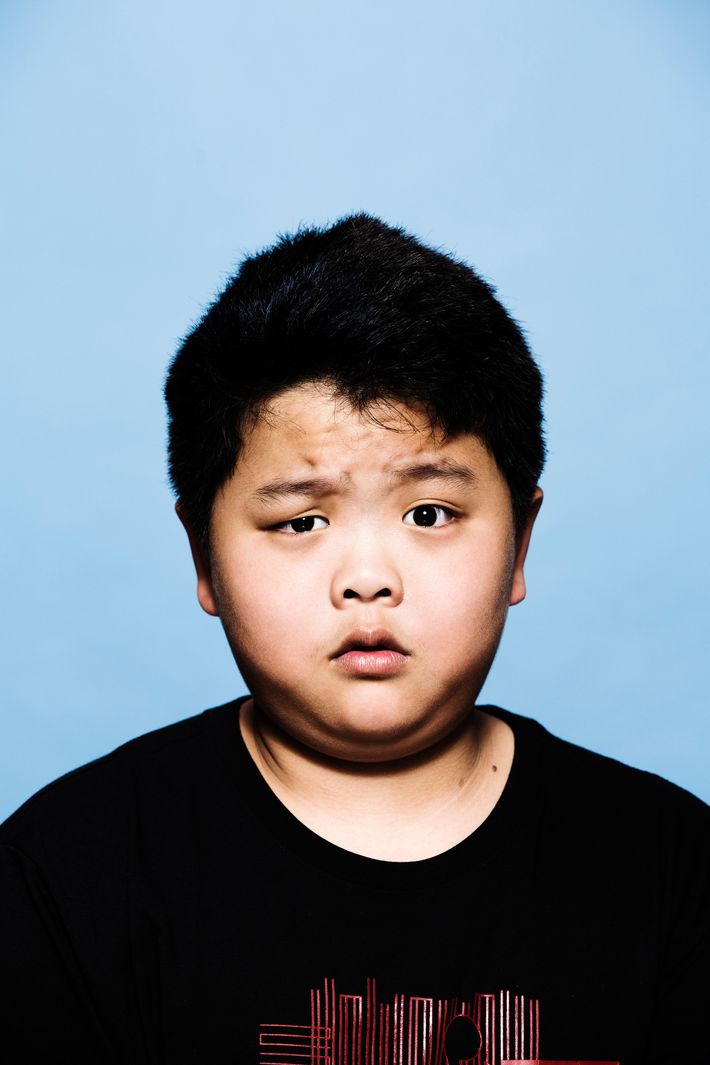
Those of you on Fresh Off the Boat, you didn’t live in the ‘90s. What’s it like to experience that era?
Hudson: It’s really different than real life right now. There was a time on set where they had the VCR tapes. And my brother was there and he was like, What is this? Is this a sort of video game? Everyone on set felt so old.
Had you ever seen a VCR tape?
Hudson: Yeah, because of my grandparents. I have seen most of the stuff on set because of my grandparents. They’re not hoarders, per se, but they have so much stuff. I’ve seen it.
What don’t you like about acting?
Marsai: I love acting. But I think we agree on this, too (looks at Miles) — I just don’t like the fittings. They already know my size but they have to try it on. Like, every time.
Ian: I really don’t like fittings, too, because when I first started Fresh Off the Boat, I had never worn buttoned-up T-shirts. And that’s all I wear on the show. So it took like an hour and 30 minutes for me to do the whole fitting.
Aubrey: Um, I hate fittings as well! When I was 4, I had to try on this super-itchy Cinderella dress.
Hudson: You can see the anger fueling. Super. Itchy!
Miles: We have to try on the same clothes like every week. But also, another not-really-fun time is that I live about an hour and a half away from set.
Ian: That’s me!
Aubrey: That’s me!
Miles: Having to wake up at 4:30 in the morning and then getting back home around 10:30. And then having to go back the next day. The lucky part is I get to sleep in the car. I have my own body pillow in the car.
Ian: My drive is about an hour and 45 minutes with traffic. But I sleep in the car, too.
Marsai: The fastest I’ve gotten to set is 45 minutes, but the slowest is 2 and a half hours.
This is such an L.A. conversation we’re having.
Albert: I love acting, but I don’t like it when shows don’t get picked up.
Forrest: The only thing I don’t like is the hiatus between seasons because you don’t see anyone.
Marsai: Last season was really rough because I was like, Man, I’m not gonna be able to see them again, what’s going on? Then we found out we had season two and I was like, I’m gonna see them again! And it was awesome.
Albert: You guys have been renewed for season three, right?
Marsai: Yes.
Albert: So have you guys?
Hudson: Yes.
Forrest: And Aubrey over here is in season seven.
Aubrey: Eight!
Miles: Also, another really bad time is, you look at Anthony and Tracee and they’re just chillin’ in their trailers and we have to be at school.
Marsai: They have an hour lunch and we just have 30 minutes. It’s just crazy.
Hudson: [Randall Park] and [Constance Wu], same thing!
Miles: You just see [Laurence Fishburne] chillin’ in his trailer, watching ESPN.
Marsai: And the worst thing is, he says “School is for suckers” all the time.
(Everybody laughs.)
Marsai: And bank! Bank is bad.
Albert: Ugh, it’s bad.
What does that mean?
Albert: Banking is, you have to do three hours of school a day but on not-so-busy days you do four hours or five hours. And then you do two on a really busy day.
Hudson: This is what I’ve been waiting to say. I love acting and I’m the luckiest out of most of you guys. I don’t have to do the horrible fittings because I’ve got those T-shirts and easy sweatpants. I have a real quick drive, like five minutes. I feel like I’m the drag sometimes. Acting is so fun, but once I walk into the studio and I hear the word work, I’m like, energy off.
How do you bring it back up?
Hudson: Uh. Candy.
Aubrey: You don’t eat candy! You never eat it!
Forrest: While he’s sucking on a lollipop. (Hudson was sucking on an orange lollipop at this point.)
Aubrey: I went to a candy store with him and he wouldn’t eat candy.
Hudson: That’s true. I used to not eat candy. And then my sweet tooth started activating when I started eating frozen yogurt. It was so sweet! So I started eating more of those sweets.
How do you prepare for your scenes?
Hudson: We have an acting coach with us every day. To me, I have to say he’s one of the greatest. I’ve never worked with another acting coach, but he’s really good. He helps run the lines, makes sure we don’t stutter or go too fast.
Does everyone have that?
Marsai: We have that.
Albert: I have an acting coach, too.
Hudson: Oh, I guess we all have that.
Aubrey: I don’t have an acting coach.
Marsai: We have an awesome dialogue coach. She helps me a lot ‘cause mostly everybody knows that Diane [her character on Black-ish] says a whole lot of stuff. She says some long words even Marsai doesn’t know. Like, man.
Miles: Especially that episode where I had to keep saying that bad word.
Marsai: Oh, the N-word.
Miles: It was really uncomfortable, and every minute my parents and everybody kept asking me if I was comfortable and I was like, “Yeah, I’m comfortable but are you comfortable?” That’s more the question. It was kind of weird. I had to ask my dialogue coach how to say bad words.
Aubrey: I was supposed to say the F-word when I was 4 years old.
Everybody: “Whoa!”
Aubrey: I know!
Hudson: Wait. Did your mom say it and then you said it back?
Aubrey: No, I said “fudge,” not the F-word. I didn’t even know what that word meant. So I asked my mom.
Albert: So did you actually say the F-word at the end?
Aubrey: No.
Forrest: So what happened, did someone else have to say it?
Aubrey: No, I just said fudge on the set.
Ian: I had an audition where I was supposed to say the F-word. I was like, I’ll just say fudge, I hope that’s okay. I was like 6 or 7.
Marsai: I had an audition where I was supposed to be a really bad girl that was adopted. That’s the only thing I’m gonna tell you about that part. But I had to say the S-word, the H-word, the F-word, the N-word.
Miles: Dang!
Hudson: So you learned all the words!
Marsai: Every single line [had] at least one bad word. And I didn’t get it because I kept saying it wrong.
Albert: How old were you?
Marsai: I was like 5. I didn’t get the part because I didn’t know. I barely even said those words. I didn’t know how to pronounce it or say it.
Albert: It’s probably for the better.
Miles: I’d be like, I don’t think I wanna get that job.
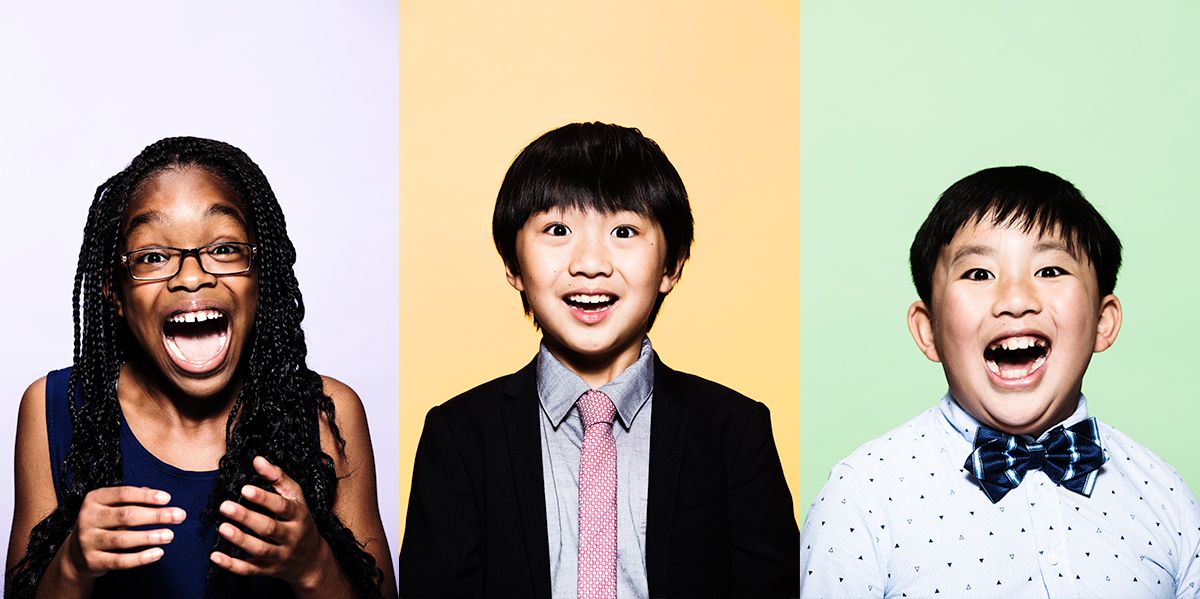
A lot of people don’t realize how many times you do scenes, and you have to be funny every single time.
Albert: For us, since we’re [a] multi-camera [show], we actually have an audience. They laugh every time, so I guess it’s easier. Sometimes if we repeat scenes, the writers or the executive producer or the director will say, They changed this to this. So it’s not always entirely repeating.
Hudson: I did work on a multi-cam once. It’s a lot easier than single-cam. When you’re doing a multi-cam, you [pre-record] some stuff. So when you have the audience there, they don’t usually redo it a lot so they can get done faster.
Albert: They don’t want the energy to die down.
Do you like being in front of an audience?
Albert: I like being in front of an audience. It’s really cool to get their feedback. But I also like single-cam because I like going to different places.
Miles: I’m not gonna say when, but me and Marsai have done multi-camera before.
You’re not going to say when?
Miles: No.
Marsai: I’m not gonna say it.
Okay!
Miles: It’s kind of way easier but it’s also harder because once you mess up doing multi-camera, you have to do the whole scene over again. For single-cam, we could just start off from that single line. But for what we had to do, we had to start the whole scene over so we had to get it in one take.
Marsai: I kept saying sorry to everybody. I was like, I’m so sorry. I know you’re tired, I’m so sorry. But sometimes it’s kind of hard because, say that you have a huge paragraph you have to say and you got that right. Whew, I got that, now we’re almost done with this scene. And then they’re like, Okay, we need to change a few more things. It’s so crazy because you already have that paragraph in your head and you’re going to have to start all over again. It’s just crazy!
Albert: Or you just finish a huge speech and then you have a five-word sentence and you trip up on one of the words and you’re like, I have to repeat that thing again!
Hudson: It’s like, Oh my God, I hate myself now!
Miles: It’s cooler when you’re doing multi-cam because when there’s an audience and they start laughing really hard, it gives you more confidence and you do it better. Instead of when nobody’s there and it’s like crickets when you’re acting.
So how do you know when you’ve nailed it?
Forrest: You just have a feeling, and then after everyone [starts clapping].
Ian: You see everybody and they’re like, “Good job!”
Do people recognize you a lot when you’re out?
Marsai: Oh, God, yes!
Hudson: One day we were out in the mall, and we were eating fro-yo and every so often somebody would come up and be like, “Aubrey, can I take your picture?” It was before I was on the show, too.
You and Aubrey have been friends for a while?
Hudson: Yes, before my show started airing. It was after the pilot. My dad and her mom were friends and then we became friends.
What do people say when they recognize you?
Marsai: One time, I was walking on the Hollywood Walk of Fame and a little kid, she was like 5 years old, said, “Oh my God, it’s you, I love you so much!” Thank you, thank you, thank you. I didn’t realize she had, like, a whole group of people. She ran back with a whole group of people, but one at a time. So she kept coming back. I took like 20 pictures.
Miles: One person can lead to 50 people!
Hudson: The worst thing is, sometimes someone will see you taking a picture with someone and they have no idea who you are. So they’ll ask, “Who is that kid?” And someone will say “He’s on Fresh Off the Boat” or something, and the person will be like, “I’ve never seen the show before, but can I take a picture with you for some reason?” I just heard you say that you’ve never seen the show before, you have no idea who I am, but you want to take a picture of me. Why?
Miles: Sometimes they won’t pronounce the name of our show right. They say Black-fish.
(Everybody laughs.)
Marsai: Anthony, our TV dad on the show, everybody looks at him and rushes him. He can’t take one step. It’s crazy!
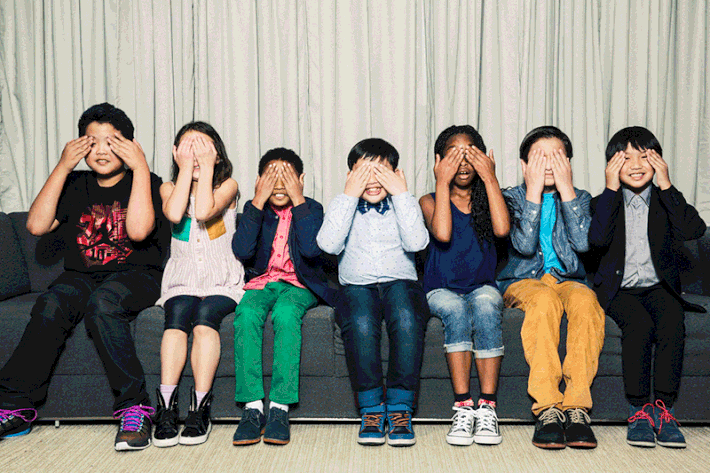
How would you feel if you got as famous as Anthony Anderson?
Marsai: It depends on my mood. If I’m sleepy, I don’t wanna.
Miles: Sometimes I just wanna say no.
Hudson: But you have to do it [out of] respect, right?
Miles: I’ve only said no once and the girl took it so personal.
Where were you?
Miles: We were at the White House.
So the cast visited the White House?
Miles: Yes, we met the president and everything.
Albert: You met the president?
Miles: This is what happened. There were so many people there, way more people than last year. You know how that place is so big. And we were in such a rush. And there was this one other girl who said, “Could we take a picture?” And I said no! Somehow it didn’t look like we were in a rush, but we were. But she took it so personal and she was all like, “But, please …” I was like, Fine then, if you’re gonna be so sad!
Marsai: Same thing with me. Remember when we were running with the First Lady? I had a cramp after and it was cold and I had to go to the bathroom. So this girl’s like, Oh my God, I love you so much, you’re the best person ever. She was almost tearing up, Can I take a picture with you? And I was like, Awwwwww. And that’s all I said. And she just said, “It’s okay,” and walked away. And I was like, Doggoneit! So I took a picture. I felt bad.
Forrest: The only thing I don’t like is when people sneakily try to take photos of you, and you can totally see they’re taking a photo of you.
Miles: What’s really annoying, though, is when people just look at you and then they look at their phone because they’re trying to look you up.
Albert: Sometimes, it’s so awkward. I was sitting at a restaurant with my parents, and at the next table they were like, “That’s the kid from Dr. Ken.” I just put my head down. Just eat and pretend they’re not there. They’re not looking you up or anything. People are horrible whisperers.
So now that you’re getting a taste of this life, do you want to still be actors when you grow up?
Hudson: I want to be a restaurateur. I love cooking.
Ian: I want to be a pilot when I grow up. For a commercial airline.
Miles: I want to be an NBA player. If I don’t make it, then I want to be a video-game graphic designer.
Ian: If I don’t make it to being a pilot, I would be a cruise-ship captain. I like transportation a lot.
Forrest: I want to be everything when I’m older. I just want adventure. Now I want to do acting. When I’m older, I want to go to college, and we’ll see from there. I want to own a business. I like cooking a lot. That’s really fun. So we could start a cooking thing [to Hudson].
Hudson: Yeah! We’ll start a restaurant together. You’ll do the normal stuff and I’ll do all the crazy-I-don’t-know-what-I’m-doing stuff.
Aubrey: I don’t want to be an actor when I grow up. I want to have a very successful business. I’m not sure what, though.
Miles: I want to be the richest person in the history of the world.
Albert: Being an actor would be awesome, but I also like directing or producing. I might want to own my own business.
Marsai: When I grow up, I want to be an actress. But I want to be a legend of something.
Miles: Oooh! What?
Marsai: When I found out I wanted to be a legend, this person was like super excited to see me. She walked to me and said, “Oh my gosh, I love you so much, can you take a picture with me?” So she took a picture with me and said, “I love you on Jessie.” [Editor’s note: The person was referring to actress Skai Jackson].
Miles: Oh, wow!
Marsai: That made me realize I want people to know me as who I am. I don’t want people to call me Marsie or Marshay. ‘Cause I don’t really know who the heck that is. That’s not me. I’m not turning around to take a picture with you. But I want people to know me, and see me, for who I am and not for Black-ish or anything like that. That’s what makes me want to be a legend. And if I’m not an actress, I want to be a singer. And if I’m not a singer or an actress, I want to be a dancer. If I’m not a dancer, singer, or an actress, I want to be a lawyer.
When you say legend, what do you mean? Who’s a legend to you?
Marsai: A legend to me is a powerful woman. Gladys Knight. Diana Ross, my TV-mother’s mother.
So Marsai is the only person who wants to keep pursuing acting?
Miles: I want to be in a Marvel movie. I wanna be the next Miles Morales. He’s the next Spider-Man.
All of your shows have had a lot of acclaim for their diversity, for portraying different cultures that make up American life. What does that mean to you?
Ian: I think it’s great that other Asian-Americans see Asian-Americans on TV so [they] know that they can make it in the show business.
Hudson: I’ve had messages on Instagram, and probably you, too, about how to get into acting. I feel like our show — the ethnicity part of it — is important because there are people out there who have been trying to pursue acting but they’ve said stuff like, Oh, we’re not looking for anybody with your race. And then they don’t get that chance. But now we’re all here to show the truth.
Miles: People actually want people like that now.
Hudson: They want people like us because our shows are doing well. And eventually, I hope, in the future there will be more of us, more of the shows like this. Just like a lot more.
Miles: We don’t want it to be rare.
Hudson: We want it to be common. Right now, it’s mostly ABC. Which is great! I love it. I want it to spread.
Forrest: Hopefully, we can inspire other networks as well to have more ethnicity shows.
Albert: It means a lot to me. I am really happy and grateful that I can represent Asian-American families on TV. I think it’s really cool that Dr. Ken is a normalized American family with no stereotypes. That’s awesome.
Marsai: And Black-ish, man, when that first came on —
Miles: People didn’t even like the title!
Marsai: Yeah, nobody liked the title. We were like, Black-ish, what? Really?
Hudson: Our show’s name is a slang, too. At first it was Far East Orlando. They chose Far East Orlando because they didn’t think anybody was gonna get upset about it. But the thing is, if we had that name, nobody would know that it’s different from any other shows. Fresh Off the Boat makes us unique and stand out. Same thing with Black-ish and Dr. Ken. A lot of people know Ken Jeong and Eddie Huang.
For you guys on Black-ish, you deal with a lot of serious topics in a comedic way, which is very hard to do.
Marsai: A whole lot of things! Some of them have to be said.
Miles: Word.
Marsai: (Laughs) About the title, people said a whole lot of things. But then when people watched the show, people said, Wow, this is cool. Don’t judge a book by its cover.
Miles: Hopefully, TV shows don’t just make other TV shows better. Hopefully, TV shows make other things better as well.
Hudson: Our shows tackle topics that not many people want to mess around with. Like the C-word and the N-word and everything, they were all covered in our shows. But we make them more like jokes. We put them in a way that it’s not actually offending someone.
But you’re also making people think about it in a different way.
Hudson: Yeah, like, to realize what’s bad about those words. When you say something, how it affects other people.
Marsai: To be honest, when “Hope” came, they were really trying to tackle that. It was about police brutality and some people were scared. I was scared.
Miles: We were scared.
Marsai: “Hope” was really deep. We didn’t want to lose anybody. We don’t want to lose fans. We don’t want offend people. We were trying to do that in season one but we were too scared to tackle that.
Miles: Also that “Crime and Punishment” episode, when that was about to come out something happened with the football player. So we pushed it back because we didn’t want to make it like we were making the episode about that. [Editor’s note: The episode, about corporal punishment, was re-scheduled because of the Adrian Peterson child-abuse scandal.)
What about you, Aubrey? Your show’s special, too, because you have a gay marriage as part of the main story.
Aubrey: I think it’s very special. And I think the whole world can maybe see that as the future one day — like, anybody can be anything. It’s just amazing.
How does it make you feel that you’re part of shows that are helping to spark this kind of discussion?
Forrest: I feel honored. Fresh Off the Boat is the first Asian-American show on network television in 20 years. Also, I hope that in the future people will carry on and it will become bigger.
Marsai: Same thing with Black-ish. I feel blessed to be on such an awesome and incredible show that has tackled so many things and everyone still loves it. And to be honest, Black-ish opened a lot of doors for other creators and other people to make awesome shows. And that’s just so awesome.
Hudson: I feel that being able to inspire and do the things we do on our show is something that more people should take up. I’m really proud that we are able to do something like this and to make a point in this world of ours to tell the truth. We’ve done a lot of damage to Earth, and we’ve gotta fix it. Not only with the things we do, but the things we say can also hurt it. By doing the things we do, we can help Band-Aid those cuts, if you know what I mean. It’s a metaphor. I’m sorry. (Laughs.)
Watch the ABC comedy kids share their views on the 2016 presidential election:
This conversation has been condensed and edited.
